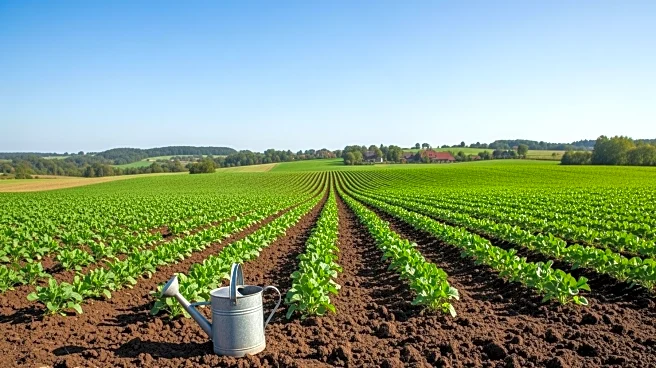What's Happening?
Nestlé has launched a significant initiative in Nigeria to combat climate change by promoting regenerative agriculture among smallholder farmers. The program, named Strengthening Farmers’ and SMEs’ Resilience
through Climate Smart Grain Production (StreFaS), is a collaboration with the Alliance for a Green Revolution in Africa (AGRA) and TechnoServe. It targets 25,000 farmers across Kaduna and Nasarawa States, aiming to embed climate-smart practices into the grain value chain. This initiative is part of Nestlé's broader strategy to secure its supply chain by improving the environmental and economic resilience of farmers. The program includes training in practices that restore soil health, reduce greenhouse gas emissions, and increase biodiversity, with the goal of achieving a 100% yield increase for participating farmers.
Why It's Important?
This initiative is crucial as it addresses the severe impacts of climate change on agriculture, which is a significant part of Nigeria's economy. By focusing on regenerative agriculture, Nestlé is not only securing its supply chain but also contributing to the sustainability of the agricultural sector. This approach helps mitigate the risks associated with climate-sensitive ecosystems, which are vital for the country's food security and economic stability. The program's success could serve as a model for other regions facing similar challenges, demonstrating how corporate-led interventions can drive positive environmental and economic outcomes.
What's Next?
Nestlé plans to continue its efforts in promoting sustainable practices by aiming to source at least 50% of key ingredients from regenerative agriculture by 2030. The company is also working on reducing its environmental footprint through improved packaging and waste management strategies. As part of its commitment, Nestlé is striving for 100% renewable electricity in its global operations by 2025, with ongoing efforts to implement water-saving technologies and renewable energy solutions in its Nigerian facilities. These steps are part of a comprehensive strategy to achieve sustainability goals and reduce the company's impact on climate change.
Beyond the Headlines
Nestlé's initiative highlights the shift from traditional corporate responsibility to integrated sustainability strategies that align business survival with environmental stewardship. This approach reflects a growing recognition that addressing climate change requires systemic changes in how companies operate and interact with their supply chains. By investing in regenerative agriculture, Nestlé is not only enhancing its business resilience but also contributing to broader societal goals of environmental sustainability and economic development.










